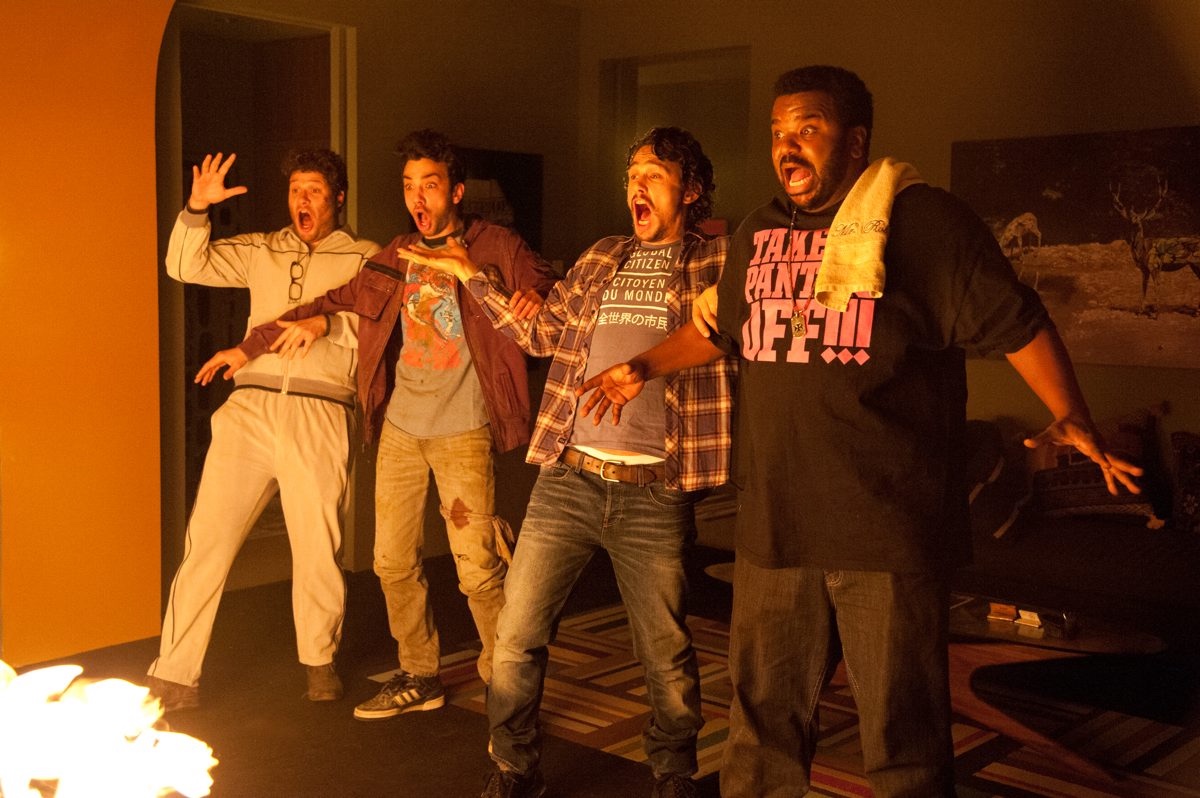Welcome to Rearview Mirror, a monthly column in which I re-view and then re-review a movie I have already seen under the new (and improved?) critical lens of 2023. I’m so happy you’re here.
I hope Rogen & co. (who definitely read this column—hi guys!) won’t be too offended when I say I expected This Is the End to age pretty badly. Not that the people involved aren’t legitimately talented or anything, but I laughed so hard in the theater (that gluten line!) and then didn’t hear about the movie for 10 years, which is the first sign of an of-its-era flick. Another sign: it came out in 2013, four years after 2012, a year after Seeking a Friend for the End of the World, the same year as Rapture-palooza, and the year before The Leftovers premiered. Apocalypse was in the water, and a trend does not a classic make. Add that to a cameo-stacked cast prominently featuring James “Canceled But Make It Artsy” Franco and you’ve got all the ingredients for a meh time.
Well, I am delighted to report that even if it doesn’t “hold up” as a laugh riot, This Is the End is a solid comedy that I found totally unobjectionable.
Jay Baruchel (Jay Baruchel) is visiting his longtime friend Seth Rogen (Seth Rogen) (you get the gist—the cast all play fictional versions of themselves) in LA for a weekend of video games and weed when Seth drags him to a Hollywood A-holes party at, of course, Franco’s mansion. Everyone does their thing—James is pretentious, Craig Robinson plays piano—or the opposite of their thing for comedic effect: Michael Cera is a coked-out fuckboy, Mindy Kaling just wants to get laid. The self-deprecation is an obvious but workable angle, and you’d think the gaggle of pals they got to show up for, I would assume, like, two days on set would get annoying. But the dialogue is snappy—especially Jonah Hill as a freakishly nice peacemaker, and Robinson’s accurate assessment of Jay as a hipster: “You hate a lot of things and the bottom of your pants are awfully tight.” That, plus the fact that Jason Segel asking Rihanna if she has a psychiatrist will always be funny. Always.
There is, of course, a do-all-the-drugs montage that’s almost shot-for-shot the same as that of any other comedy from the era—except this one is literally set to “Gangnam Style,” so you know for sure it’s 2013.
Seth and Jay briefly ditch the party to go to 7-Eleven (where they encounter a mean Black cashier, one of the few glaring stereotypes in the film), and then the rapture happens. This being Los Angeles, a modern day Gomorrah, lots of people are left behind, including every single celebrity. Back at Franco’s, our main gang (including Hill, Rogen, Baruchel, Robinson, and, later, Danny McBride) huddles together to survive, COVID-style, by locking themselves indoors and divvying up the food.
There’s a good amount of what 14-year-old boys would find hilariously edgy. Oh my god, jizzing! Oh my god, saying “pussy” around your friends! Oh my god, what if they made a sequel to Pineapple Express! There are some to-camera confessionals that are pretty good, and a lot of jokes about James Franco’s filmography that are also good…well, if you’re already familiar with James Franco’s filmography. I’m not sure they’ll make much sense to viewers who are young today.
This being the year between Jump Streets, (and two years before The Night Before), there is, of course, a do-all-the-drugs montage that’s almost shot-for-shot the same as that of any other comedy from the era—except this one is literally set to “Gangnam Style,” so you know for sure it’s 2013. Framing this low-hanging fruit, though, is solid writing. You can tell more care and craft went into this script than, say, 30 Minutes or Less. It’s closer to the bromantic, fully invested adventure of Superbad.
What looks like an excuse for a bunch of stoner bros to hang out together is revealed to be a story that follows all the fundamentals.
Jay and Seth’s friendship is fleshed out, explored, and tested, and the movie gets a lot of mileage out of the idea that all these men are scared to be intimate and vulnerable with one another without being outright gay panic-y. The scene where they debate who’s most likely to rape Emma Watson? Funny. The scene where Jonah Hill is possessed by a demon who doesn’t find the power of Christ very compelling? Funny! The scene where they each confess why they haven’t gotten into heaven? Made me realize this is actually a very smart idea for a movie. What looks like an excuse for a bunch of stoner bros to hang out together is revealed to be a story that follows all the fundamentals. By the time they’re sacrificing themselves for one another and getting raptured—and Channing Tatum is a dog/slave in Danny’s Mad Max–style road gang—shit’s paying off.
Producer Jason Stone first explored this idea in the 2007 short “Jay and Seth vs. the Apocalypse,” and while basically nothing carried over to the feature film, the friendship did. Maybe the secret sauce is that here, they cared. This is one that mattered.
Much like Bruce Almighty, This Is the End takes the Bible as literally as it needs to and preaches nothing more radical than “be good to one another,” which I can get behind—big swinging Lucifer dicks and all. And the best part is that by the end, when our faves are reunited for a Backstreet Boys concert in the clouds, James Franco isn’t there. ’Cuz you know that boy ain’t seeing heaven. Prophetic? FL







